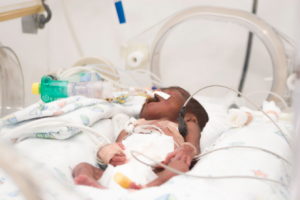About GBS
Group B Streptococcus
Group B Streptococcal (GBS) is the leading cause of life-threatening infections in newborns.
Colonization of pregnant women with GBS may lead to adverse pregnancy outcomes such as late abortions, stillbirths, and preterm delivery. Colonization may also lead to life-threatening infections in newborns for the first 3 months of life, causing pneumonia, septicemia and meningitis, which may lead to death or life-long disability
Prevention of Group B Streptococcal infections in newborns represents a large unmet medical need.
 GBS is responsible for 50% of life-threatening infections in newborns and affects 0.5-2 in 1,000 such babies, depending on the geographical region. At any given time, some 15-25% of women are spontaneously colonized with GBS, and they run the risk of transmitting the bacteria both to their child in the womb, during birth and during the first months of life. GBS infection in the unborn child may lead to premature delivery or stillbirth, and GBS infection in the newborn child may result in sepsis, pneumonia or meningitis, all of which carry a significant risk of severe morbidity, long-term disability or death. Annually, GBS is responsible for some 320,000 cases of neonatal invasive disease, 60,000 stillbirths, 3,500,000 preterm deliveries, and 10,000 babies suffering from long-term neurological damage world-wide.
GBS is responsible for 50% of life-threatening infections in newborns and affects 0.5-2 in 1,000 such babies, depending on the geographical region. At any given time, some 15-25% of women are spontaneously colonized with GBS, and they run the risk of transmitting the bacteria both to their child in the womb, during birth and during the first months of life. GBS infection in the unborn child may lead to premature delivery or stillbirth, and GBS infection in the newborn child may result in sepsis, pneumonia or meningitis, all of which carry a significant risk of severe morbidity, long-term disability or death. Annually, GBS is responsible for some 320,000 cases of neonatal invasive disease, 60,000 stillbirths, 3,500,000 preterm deliveries, and 10,000 babies suffering from long-term neurological damage world-wide.
Current GBS intervention, involving antibiotic prophylaxis during childbirth (known as intra-partum antibiotic prophylaxis or IAP) in women colonized with GBS late in pregnancy or otherwise at risk of transmitting the bacteria to the newborn. The introduction of IAP, has reduced the incidence of Early Onset Disease (EOD) occurring within the first 6 days of life by some 80% since its introduction in year 2000. However,
- IAP has failed to fully eradicate EOD for a number of practical reasons, and is not universally implemented in all countries;
- IAP has no impact on GBS-induced late abortions, stillbirth or premature delivery caused by GBS colonization during pregnacy;
- IAP has no impact on Late Onset Disease occurring from 7 days to 3 months of age, where the burden of meningitis is highest. 50% of babies who recover from GBS meningitis have long-term sequelae, including brain damage, cerebral palsy, severe learning difficulties, hearing loss, and/or blindness;
- IAP is currently only available in high-income countries and is unlikely to be implemented in low-income countries;
- The efficacy of IAP is currently under threat from emerging antibiotic resistance in GBS, including the most commonly used antibiotics such as penicillin;
- And finally, wide-spread antibiotic prophylaxis in birthing women may negatively impact the developing intestinal microbiota of the newborn increasing the risk of eczema, asthma, ADHD, and learning disabilities
The development of an efficacious GBS vaccine for maternal immunization capable of inducing high levels of protective antibodies in pregnant women may address shortfall in current intervention strategies, and address current unmet medical needs:
- Protect the pregnant women against adverse pregnancy outcomes caused by GBS such as late abortions, stillbirth and preterm delivery
- Passively immunize the unborn fetus, protecting against GBS infections in utero
- Protect the newborn baby for up to 3 months after delivery, while at risk of GBS infections
- Prevent the excessive use of prophylactic antibiotics, reducing the development of antibiotic resistant bacteria and improve the development of the neonatal microbiome
